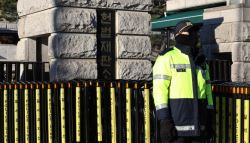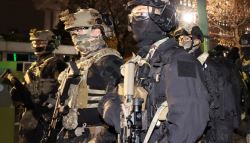[edaily 국제부] "FITCH COMMENTS ON RISKS FROM NORTH KOREA"
Fitch Ratings-London/Hong Kong-February 13, 2003: In commenting on the implications of rising tensions on the Korean peninsula for the sovereign creditworthiness of South Korea, Fitch Ratings said today that recent developments remain consistent with risk levels already factored into South Korea"s Long-term foreign currency rating of "A", noting that on a number of occasions in the past tensions have been very high, yet still culminated in peaceful resolution.
Fitch expects a diplomatic resolution to the current crisis to emerge and continues to view war as an extreme scenario. South Korea"s economic fundamentals are strong enough to absorb a period of heightened tension without seriously threatening its sovereign creditworthiness. Only if the agency judged there to be a material increase in war risk would it review the ratings.
It is Fitch"s opinion that alarming statements made by North Korea in recent weeks do not reflect an increased compulsion to initiate a military attack on South Korea or any other nation. Rather they represent strategic behaviour on the part of the North Koreans. Such rhetoric is a frequent feature of politics on the Korean peninsula. South Korea"s economic fundamentals - including its net external creditor status, strong international liquidity position, fiscal and current account surpluses and post-crisis growth performance - leave it well placed to withstand even a prolonged period of heightened tension without damaging its creditworthiness. Its vulnerability to swings in international investor sentiment is low.
A diplomatic resolution to the current North Korean crisis remains the most likely outcome. For its part North Korea is fully aware that any military confrontation with the South would be impossible to win and would entail potentially devastating consequences for both countries. Likewise, with the stakes for regional and global security extremely high, the international community would likely find it hard to countenance outright military confrontation. As such, Fitch views that, despite the stepped-up rhetoric, the risk of war remains low and consistent with that already factored into South Korea"s credit rating. Any diplomatic resolution to the current crisis would require North Korea to end its nuclear activities and accommodate weapons inspectors in return for the resumption of limited economic assistance. With North Korea having violated the 1994 Agreed Framework through its failure to cease its nuclear programme, this would likely require a new multilateral framework. This may emerge following the International Atomic Energy Agency"s referral of North Korea to the United Nations Security Council.
Nevertheless, the risk of a further escalation in tensions cannot be ruled out and it is possible that certain events could result in a material increase in the probability of war. In past episodes North Korea has engaged in demonstrations of its military capabilities, including missile testing. They may well perceive that these previous actions have wrought positive results in terms of securing strategic goals. But in the current geopolitical environment such actions would represent a significant increase in the level of tension and, if judged to materially increase the risk of war, would have negative implications for South Korea"s creditworthiness and sovereign ratings.




![‘세 명' 살리고 하늘로 간 ‘세 아이 엄마'…유족 “보고싶다” [따전소]](https://image.edaily.co.kr/images/vision/files/NP/S/2024/12/PS24122300722t.jpg)